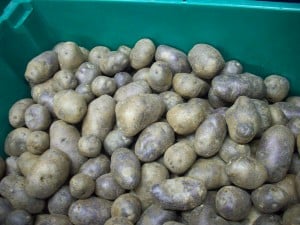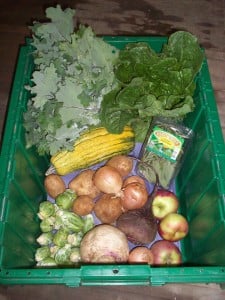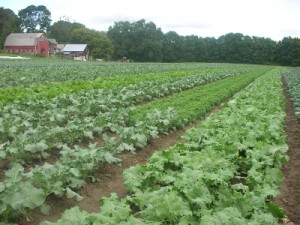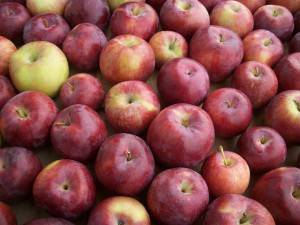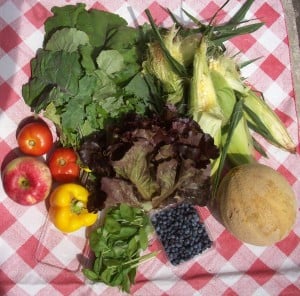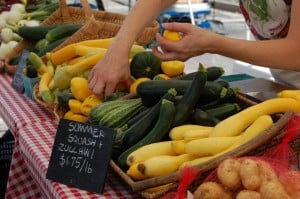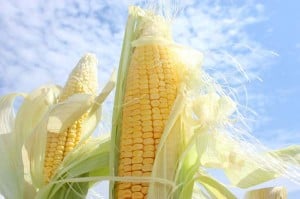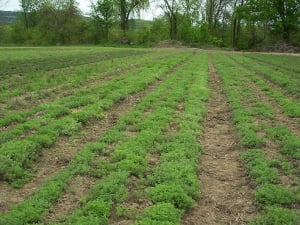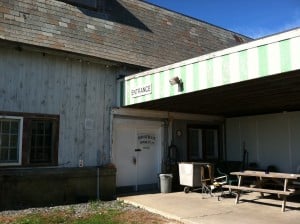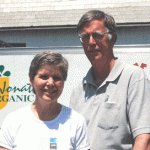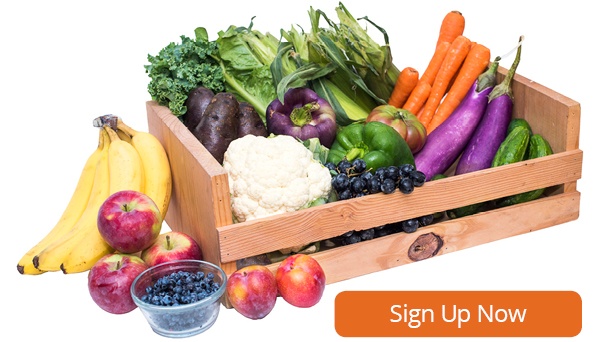This week's produce includes the likes of local blue potatoes from Atlas Farm, beets, carrots, and delicata squash. Basil is the herb of the week. Equal Exchange add-ons are on sale throughout the month of October, and the featured add-on of the week is a bar of Organic Dark Chocolate with Almonds from EE. Check out the newsletter!
Topic: Organic Farmers
Recent Posts
Topics: produce delivery, Recipes, Local Dogma Box, Newsletter, Organic Farmers, Home Cooking Kitchen Tips, Organic Grocery Delivery Boston, Healthy Office
The Dogma Box is transitioning into local fall produce in a lovely way. Atlas Farm is moving further into their fall harvest and that means potatoes, onions, and beets are being added to the list.
We're also starting to work more with Deep Root Organic Coop, a cooperative of almost 20 organic farms in northern Vermont and southern Quebec. We work with them mostly in the colder months to get some of the best root veggies around! This week we're getting delicata squash, turnips, and Brussels sprouts from Deep Root.
This week’s Dogma Box includes:
- Delicata Squash - Deep Root Organic Coop (Johnson, VT)
- Turnips - Deep Root Organic Coop (Johnson, VT)
- Brussels Sprouts - Deep Root Organic Coop (Johnson, VT)
- Potatoes -Atlas Farm (S. Deerfield, MA)
- Beets- Atlas Farm (S. Deerfield, MA)
- Onions- Atlas Farm (S. Deerfield, MA)
- Kale - Atlas Farm (S. Deerfield, MA)
- Romaine Lettuce - Atlas Farm (S. Deerfield, MA)
- McIntosh Apples - Dwight Miller & Son Orchards (E. Dummerston, VT)
- Mixed Herbs- Happy Valley Organics (Whately, MA)
Brussels sprouts are very hard to find locally, and these look particularly great. We've got a few preparation tips and recipes for this notorious veggie on our Brussels Sprouts page.
Recipes
The recipes below work well with many of the items that you’re receiving in the Dogma Box this week. These recipes are usually quite flexible and easily adaptable based on your pantry and your dietary needs. Feel free to get creative in the kitchen! If you come up with new ways to use some of our recipes and would like to share, post them on our Facebook or Tweet us.
What are you cooking this week? Feel free to share with us at any time! For more recipes, check out the Produce Info, Storage Tips and Recipes section on our website and browse recipes by item. Here you can find nutritional information, preparation tips, and recipes for each produce item we offer. Happy eating from your friends at Boston Organics!
Topics: Recipes, Local Dogma Box, Organic Farmers, Home Cooking Kitchen Tips, Organic Grocery Delivery Boston
Happy October! October is shaping up to be quite a busy month with the Boston Local Food Festival and the Boston Vegetarian Food Festival coming up soon. We're also celebrating Non-GMO Month and Fair Trade Month with a sale on Equal Exchange coffees, teas, and chocolates throughout October!
Topics: produce delivery, Recipes, Local Dogma Box, Newsletter, Organic Farmers, Community Events, Home Cooking Kitchen Tips, Organic Grocery Delivery Boston, Non GMO, Healthy Office
*UPDATED OCTOBER 2018
Autumn in New England means apple picking season. A great activity for people of all ages, picking local fruit is an exciting (and delicious) experience and there are steps you can take to make it an even healthier one.
Topics: Fall Produce, Organic Farmers, Home Cooking Kitchen Tips, Organic Grocery Delivery Boston, Guides and Infographics
Topics: Recipes, Local Dogma Box, Organic Farmers, Home Cooking Kitchen Tips
Questions to Ask Your Farmer at the Farmers Market!
One of the most anticipated gifts of summer has arrived. Summer farmers markets have popped up around Boston! There’s nothing quite like meeting the farmer who grew your food and being able to ask about where your produce came from and how it was grown.
Farmers markets offer the chance for shoppers to make the most informed decisions, and that starts with knowing where your food is coming from. In order to make the best choices for you, your family, and the environment, use the farmers market as an opportunity to educate yourself! Local foods can still have pesticides on them, so ask around and find out what the farmers are using on their crops. Most farmers are more than happy to tell you all about what they do and how they grow their produce.
In order to learn more about the foods at your local farmers markets, here are some questions we think are helpful to ask the farmers you meet.
Do you follow organic guidelines or other environmentally sustainable agricultural practices?
- If the farm is Certified Organic, then you can know with confidence that they are using strict guidelines that ensure your food is being produced in a safe and sustainable way. However, just because a farm isn’t Certified Organic, it doesn’t mean they don’t use sustainable agricultural methods. Without the certification, you may need to do a little more research to better understand what they are and are not doing. Farmers markets provide a great opportunity to find out directly from the grower what kinds of practices they use.
- To get a better sense of what all of it means for the farmer, the crops, the environment, and you, you may want to ask the farmers the following questions...
How do you fertilize?
There are many effective and safe ways to fertilize soil in sustainable ways. Find out the farmer’s methods and look into it yourself!
Do you use any synthetic pesticides or fungicides?
As a general rule, all synthetic chemicals are prohibited in organic agriculture. The presence of agricultural chemicals like pesticides in our food system is greater now than it ever has been, and the long term effects of exposure to these chemicals are, at best, not reliably known, and at worst, proven to cause harm to humans. Due to the sheer amount of these chemicals that are used all around us, we just can't escape them. We need to be particularly careful about what we expose our children to: even small concentrations of agricultural chemicals in growing bodies isn't good.
How do you manage pests and disease? Do you practice Integrated Pest Management?
Some farms practice techniques such as integrated pest management (IPM) in order to limit the amount of synthetic pesticides they release into the environment. Since this is not regulated and there are no standards, IPM can vary from farm to farm.
Do you use genetically modified seeds (GMOs)?
Genetically modified seeds are relatively new but are gaining widespread use. The long term health and environmental risks which GMOs pose have not yet been adequately investigated. Genetically modified seeds and foods are prohibited in Organic standards. Organic certification is one of the only safeguards against GMOs.
How do you decide which products to grow?
What crops are coming into season next? Are they growing on a schedule?
How has the weather impacted your crops this season?
What’s your favorite fruit or vegetable?
To learn more about the benefits of produce that's both local AND organic, check out this great article!
What questions do you like to ask your farmers at the farmers market? Let us know!
Topics: Organic Farmers
Genetically Modified Corn on the Cob, a New Step for GMOs
Corn on the cob is for sale at most grocery stores this summer and depending on where you shop it may be Monsanto’s Bt sweet corn. Since this corn is unlabeled, it's quite possible that you might be buying it without knowing it. Here's some basic information to help you understand more about this corn variety and why it's a concern.
This unlabelled item is a new kind of ready-to-eat corn. It is genetically modified with Bt, the bacteria Bacillus theringiensis, commonly used on crops as a pesticide. Once the bacteria Bt is ingested by an insect, the insect’s intestinal tract fails, killing them within a couple of days.
Bt has been used as a pesticide spray for decades but farmers found that it washes off and biodegrades in sunlight. Now Bt is genetically tied into the corn plant as a built-in pesticide. This is the first genetically engineered Monsanto product being eaten directly by consumers with minimum processing. Bt Corn has been on the market since 1996, but had only been used in processed foods like corn syrup. The Bt-toxin is claimed to be safe for humans and animals, supposedly destroyed by the human digestive system. It is unclear what, if anything, will happen when an unprocessed food like sweet corn is eaten by consumers. The long term health and environmental risks which GMOs pose have not yet been adequately investigated.
Widespread cultivation of Bt corn could have major environmental and societal ramifications. Farmers must be careful to avoid creating Bt-resistant strains of the very pests that the poison targets. It also theorized that such genetically modified produce could explain the drastic increase in childhood food allergies.
The corn that we offer here at Boston Organics is certified organic and is never genetically modified. Whenever you see the "USDA Organic" seal it means that the food has been certified to conform to this set of legal definitions and rules. Genetically modified organisms (GMOs) such as genetically modified seeds and foods are prohibited in Organic standards. Organic certification is one of the only safeguards against GMOs.
Talk to your grocers and ask where their produce is coming from!
For more information on what it means to be certified organic visit the Organic Consumers Association
Learn about Bt in Organic Farming vs. Bt in GM Crops.
Topics: Organic Farmers
Spring is on its way, and that means our partner farmers in New England are gearing up to plant their crops for the upcoming growing season. We're looking forward to the bounty of local produce ahead! We've got a beautiful week ahead of us and lots of reasons to celebrate (eat), so check out our Pi Day recipe for Traditional Apple Pie, and a good old-fashioned recipe for Corned Beef with Cabbage, just in time for your St. Patrick's Day celebrations! Check out the newsletter!
Topics: Newsletter, Organic Farmers
A Visit with Jonathan's Organic and Cranberry Growers!
We recently took a trip down to Rochester, MA to visit our friends at Jonathan's Sprouts and learn more about where their sprouts come from. Liz Reilley, Jonathan's Director of Sales & Marketing, was kind enough to show us around their main sprout facility, which has been in the same large barn for over 30 years! We even got to sneak a few samples.
After putting on our hair nets and lab coats, Liz showed us their seed storage room and explained the importance of seed testing. Food safety is a top priority for Jonathan’s Sprouts, which is why they thoroughly sample and test all of their products from seed to sprout. Sprouts are grown from seed to sprout in only a week, and they can be grown year-round.
Our next stop was the sprout packing room, where we were surrounded by racks of beautiful alfalfa sprouts, sunflower sprouts, mung bean sprouts, and spicy radish sprouts. We were pleasantly surprised to find that instead of using a mechanized packing process, Jonathan's employees weigh and pack each container of fresh sprouts by hand. They are able to package and distribute approximately 40 tons of sprouts each week!
Once packaged, the sprouts are distributed to supermarkets, specialty markets, wholesale distributors, and small grocery services like Boston Organics! Click here to read more about Jonathan's Organic and why they believe in organic practices.
After our lovely visit with the Jonathan's Sprouts crew, Liz took us to Buzzards Bay to see how cranberries are harvested and meet some of the cranberry growers that Jonathan's works with each year. In the fall, Jonathan's packages and distributes cranberries for local cranberry growers. Despite the short harvest season (October through December), cranberries are a major commercial crop in Massachusetts, and the cranberry harvest is the main source of income for many Massachusetts families.
Keith Mann, a fourth generation cranberry grower, showed us how cranberries are harvested at the bog. Cranberries grow on shallow vines, and growers flood the bogs with water in order to harvest the cranberries. Once the bog is flooded, the growers use a harvesting machine that quickly stirs up the water and loosens the cranberries from the vine. Cranberries have small air pockets in their center, which causes them to float to the top. This creates the scene that you see in Ocean Spray commercials. Check out this video of Keith explaining the harvesting process.
The floating berries are then corralled and put on a conveyor that takes them up to a truck. The cranberries are separated from the debris before being taken to a warehouse, where they’re cleaned, sorted, and packaged.
Keith explained that most cranberries are wet-picked because the wet picking process produces a higher yield and requires less time and labor. The wet-picked berries are typically used for juice, sauce, and other processed foods. Roughly 10 percent of cranberries are dry harvested and sold as fresh fruit.
As we approach the holiday that brings cranberries to the forefront of our plates, we're thankful for the growers who work hard to get them to us. If you have any questions about cranberries, sprouts, or anything else we offer, send us an email and we'll make sure your questions get answered!
Topics: Organic Farmers
How it all began:
In the early 1970’s, Bob and Barbara Sanderson started growing organic sprouts in an old barn in Rochester, MA. With a few alfalfa seeds and a vision of growing and selling good, healthy produce year-round, they started growing sprouts on a small scale for friends and small retailers. In 1976, they convinced Shaw’s to start carrying their products, and they've been in business ever since.
Where they are now:
With approximately 50 employees and 2 facilities in Massachusetts, Jonathan’s Sprouts is a leader in the sprout industry and supplies sprouts for supermarkets, specialty markets, wholesale distributors, and small grocery services like Boston Organics!
Bob and Barbara have been credited with bringing sprouts to the retail market in the New England region. In the early 1980s, Bob and Barbara founded the New England Sprout Growers Association, which, in 1989, seeded the International Sprout Growers Association, The associations bring together sprout growers from around the world every year to discuss important topics within the industry and strengthen the relationship between sprout growers worldwide. Bob and Barbara also played an instrumental role in bringing organic produce - as a category - to mainstream supermarkets.
Products:
Jonathan's grows a variety of delicious sprouts, including: radish sprouts, broccoli sprouts, pea shoots, mung bean sprouts, alfalfa sprouts, clover sprouts, sunflower greens, and a “Munchin’ Mix” of peas, lentils, and adzuki beans. Jonathan's grows all products using organic practices. During Massachusetts cranberry season (October through December), Jonathan’s also packages and distributes organic cranberries from local Massachusetts cranberry growers.
Why organic?
"It's very important to me that we don't contaminate the environment with pesticides," says Barbara Sanderson. "Equally important is the nutritional aspect of organic produce. Plants that are not chemically fertilized send out enzymes that digest the soil, absorbing many micro-nutrients not available in the "instant" fertilizers. These "phyto-chemicals" (plant chemicals) are well known in research for helping prevent chronic and age-related diseases, as well as cancers."
"I'm definitely an organic consumer."
What's your favorite fruit or vegetable?
Barbara: "I'm eating a lot of sprouts. I spread hummus or another spread onto a piece of flat round whole wheat bread, put an ounce of sprouts on it, and roll it up. I also love avocado. Avocado and Alfalfa sprouts make the best sandwich. You don't even need a dressing."
What's next for Jonathan's Sprouts?
They're working with a grower in New Jersey who grows beautiful rainbow microgreens. They're hoping to bring these microgreens to supermarket shelves in the near future.
We're thrilled to continue our relationship with Jonathan's Sprouts and provide our customers with some of the healthiest and best tasting organic sprouts on the market. Stay tuned for photos and videos from our visit with Jonathan's and their cranberry growers!
Topics: Organic Farmers
Subscribe to Email Updates
Recent Posts
Posts by Topic
- Newsletter (483)
- Organic Grocery Delivery Boston (347)
- Recipes (323)
- Local Dogma Box (301)
- New England Local Fruits and Vegetables (211)
- Organic Farmers (206)
- Eat Local (190)
- boston organics (179)
- Original Boston Organics Blog (168)
- produce delivery (158)
- organic produce (141)
- Organic Grocery Add-Ons (140)
- Fresh From the Farm (115)
- Holiday (99)
- Home Cooking Kitchen Tips (92)
- Atlas Farm (91)
- CSA (81)
- Happy Valley Organics (65)
- Community Events (61)
- Healthy Office (56)
- deep root organic coop (56)
- summer produce (56)
- Organic Herbs (55)
- Beneath The Peel / Digging Deeper (54)
- Boston Organics Community (52)
- Organic Root Vegetables (47)
- organic tomatoes (47)
- Organic Leafy Greens (46)
- miscellaneous (41)
- Organic Squash (38)
- Winter moon farm (38)
- Fall Produce (37)
- Vegetarian and Vegan Food (36)
- organic carrots (35)
- Guides and Infographics (34)
- Organic Radishes (34)
- Winter Produce (34)
- Organic Sprouts (33)
- organic citrus (33)
- spring produce (33)
- organic beets (31)
- Organic Potatoes (29)
- Company Updates (28)
- Organic Cucumbers (28)
- organic basil (28)
- Organic Mushrooms (27)
- Organic Parsnips (27)
- marketing (27)
- Organic Apples (26)
- Organic Stone Fruit (26)
- Contests (25)
- Organic Cabbage (24)
- Organic Turnips (24)
- bio (24)
- office (24)
- Boston Local Partnerships (23)
- Local Season (22)
- Non GMO (20)
- Organic Greens (20)
- organic blueberries (20)
- organic kale (20)
- Food Politics (19)
- holidays (19)
- member spotlight (19)
- organic sunchokes (19)
- Locavore (18)
- Organic Onions (18)
- The Boston Organics Crew (18)
- Organic Fruit Delivery (17)
- Organic Kohlrabi (17)
- Jeff's Corner (16)
- Organic Bell Peppers (16)
- The Kitchen Garden (14)
- Organic Cranberries (13)
- Organic Eggplants (13)
- Thanksgiving (13)
- organic garlic scapes (13)
- Environmental Businesses (12)
- Organic Celeriac (12)
- Organic Mangoes (12)
- Organic Strawberries (12)
- organic sweet potatoes (12)
- sustainability (12)
- vegan (12)
- vegetarian (12)
- Fair Trade and Organic (11)
- Food System (11)
- Organic Broccoli (11)
- Organic Chard (11)
- Organic Collard Greens (11)
- Organic Compost (11)
- Organic Meal Kits (11)
- how to (11)
- organic corn (11)
- organic fruit (11)
- website (11)
- Community (10)
- Community Impact (10)
- Donations (10)
- Grower & Producer (10)
- Meal Planning (10)
- New England Winter Cooking (10)
- Organic Pears (10)
- Organic Yogurt (10)
- Queen's Greens (10)
- Red Fire Farm (10)
- winter squash (10)
- Farms (9)
- Jonathan's Sprouts (9)
- Organic Bananas (9)
- Organic Bok Choy (9)
- Organic Garlic (9)
- Organic Green Beans (9)
- Taza Chocolate (9)
- organic avocados (9)
- winter (9)
- Boston (8)
- Cargo Bike Delivery (8)
- What's In The Dogma Box (8)
- organic kiwis (8)
- winter root vegetable (8)
- winter vegetables (8)
- Equal Exchange (7)
- Organic Fennel (7)
- Organic Non GMO Corn (7)
- Year In Review (7)
- healthy eating (7)
- instructions (7)
- know your farm (7)
- organic recipes (7)
- round the world (7)
- winter greens (7)
- 21 Day Racial Inequity Challenge (6)
- About Organic (6)
- Extreme Weather (6)
- Food Solutions New England (6)
- Race (6)
- Racism (6)
- Riverland Farm (6)
- organic leeks (6)
- organic rosemary (6)
- Dwight Miller Orchard (5)
- FDA (5)
- Mousam Valley (5)
- Office wellness program (5)
- Organic Brussels Sprouts (5)
- Organic Chocolate (5)
- Organic Dandelions (5)
- Organic Juice (5)
- Organic Kiwi Berries (5)
- Organic Milk (5)
- coronavirus (5)
- covid-19 (5)
- custom box (5)
- donation (5)
- fermentation (5)
- food donation (5)
- gift cards (5)
- grocery delivery (5)
- organic persimmons (5)
- Cooking (4)
- Jonathan's Organic (4)
- Lakeside Organics of Hadley (4)
- Organic Cauliflower (4)
- Picadilly Farm (4)
- fruit delivery (4)
- know your farmer (4)
- local business (4)
- mi tierra (4)
- organic rhubarb (4)
- organic rutabagas (4)
- organic watermelon (4)
- oxen hill farm (4)
- perks (4)
- pie recipes (4)
- pumpkin (4)
- salad (4)
- snacks (4)
- Black Earth Compost (3)
- Certified B Corporation (3)
- Employee wellness (3)
- EmployeeBenefits (3)
- Into the pantry (3)
- Organic Zucchini (3)
- Purchaser's Corner (3)
- Root vegetables (3)
- Seven Hills Pasta (3)
- Storage Tips (3)
- Tagine (3)
- Winter Moon Roots (3)
- chili (3)
- dips (3)
- environmental (3)
- food relief (3)
- gardening (3)
- grilling (3)
- harvest preparation (3)
- on the farm (3)
- organic asparagus (3)
- organic celery (3)
- organic green leaf lettuce (3)
- organic peppers (3)
- organic pomegranate (3)
- pi day (3)
- pickles (3)
- productivity (3)
- resources (3)
- social distancing (3)
- superbowl (3)
- tricks (3)
- vegetarian savory pies (3)
- work from home (3)
- Butterworks Yogurt (2)
- Community Partnership (2)
- Earth Day (2)
- FAQ (2)
- Food For Free (2)
- Japanese curry (2)
- Maine Wild Blueberries (2)
- NationalCabbageDay (2)
- Organic Arugula (2)
- Organic Dried Beans (2)
- Organic Scallions (2)
- Organic Tomatillos (2)
- The Ktichen Garden (2)
- Witchcat Farm (2)
- avocado (2)
- christmas (2)
- corporate wellness (2)
- cranberry relish (2)
- cucumbers (2)
- customer (2)
- delivery (2)
- delivery instructions (2)
- diy (2)
- eggs (2)
- food access (2)
- food waste (2)
- frittata (2)
- guide to basic soup (2)
- heirloom tomatoes (2)
- meditation (2)
- organic beverages (2)
- organic cocktails (2)
- organic drinks (2)
- organic fruits and veggies (2)
- organic hechiya persimmon (2)
- organic mandarins (2)
- organic parsley (2)
- organic salsa (2)
- organic shiitake mushrooms (2)
- organic smoothie (2)
- organic vegetables (2)
- overnight oats (2)
- pesto (2)
- pumpkin pie (2)
- recycling program (2)
- remote (2)
- salad for dinner (2)
- snow day (2)
- soup guide (2)
- truly amazing soup (2)
- volunteer (2)
- waste (2)
- 2019 trends (1)
- Accountability (1)
- Albert Einstein (1)
- Bevi (1)
- Bootstrap Compost (1)
- Bravo Botanicals (1)
- Burke Hill Farm (1)
- CBD (1)
- CBD oil (1)
- CDC (1)
- CO2 extraction (1)
- Cannabidiol (1)
- Canning (1)
- Charity (1)
- Chinese New Year (1)
- Chioggia beet (1)
- Cold Brew Coffee (1)
- Cooperatives (1)
- Customer review (1)
- Deans Beans (1)
- Direct Trade (1)
- Energy Assessment (1)
- Extra produce (1)
- Family owned farms (1)
- Food Security (1)
- Food safety (1)
- Freezing (1)
- Ginger (1)
- Go Fund Me (1)
- Guatemalan Immigrant (1)
- HRConference (1)
- Hanukkah (1)
- Harlow Farm (1)
- Health insurance (1)
- Heiwa Tofu (1)
- Household Goods (1)
- Immigrant owned farms (1)
- Jessica Lynch (1)
- Kombucha (1)
- Labor Day (1)
- Latkes (1)
- Lillie Marshall (1)
- Lunar Festival (1)
- Lynn (1)
- Mass Save (1)
- Matt's Meals (1)
- NationalSoupMonth (1)
- Nature's Circle Farm (1)
- Organic Cantaloupe (1)
- Organic Chives (1)
- Organic Lentils (1)
- Organic Meyer Lemons (1)
- Organic Mint (1)
- Organic Papayas (1)
- Organic Pea Shoots (1)
- Organic Radicchio (1)
- Organic lovage (1)
- Organic vs Conventional (1)
- Organizing (1)
- Paid time off (1)
- Patriots (1)
- Produce boxes (1)
- Protein (1)
- Rise Brewing (1)
- Riverland (1)
- Sanitizing (1)
- Soofa (1)
- St. Patrick's Day (1)
- Tacos (1)
- Tofu (1)
- Valentine's Day (1)
- WBZ Radio (1)
- Western Mass (1)
- Wishroute (1)
- activities (1)
- avian flu (1)
- avocado toast (1)
- baba ganoush (1)
- baby bok choy (1)
- barbeque (1)
- being present (1)
- best gifts for foodies (1)
- bok choy (1)
- bored (1)
- boston startup (1)
- boxes (1)
- bulgur (1)
- cannabis plant (1)
- chicken (1)
- chips (1)
- chocolate cranberry cake (1)
- cider (1)
- coffee (1)
- couscous (1)
- cranberry salsa (1)
- cranberry sauce (1)
- cranberry shrubs (1)
- curbside pick up (1)
- discount code (1)
- drink water (1)
- eat your vegetables (1)
- election (1)
- enter to win (1)
- excess produce (1)
- farm partners (1)
- farro (1)
- feedback (1)
- fish (1)
- food is medicine (1)
- fourth of July (1)
- fresh made simple (1)
- fuyu persimmons (1)
- games (1)
- giving (1)
- golden nugget (1)
- grain (1)
- grain bowl (1)
- greek-style (1)
- greenhouse (1)
- guacamole (1)
- health (1)
- healthy fruits (1)
- hemp (1)
- herb garden (1)
- herbs (1)
- homemade salsa (1)
- how to update your account (1)
- hummus (1)
- indoors (1)
- jennifer hanway (1)
- logistics (1)
- main course salads (1)
- meat (1)
- meditate (1)
- mindfulness (1)
- miso (1)
- mocktails (1)
- muhammara (1)
- napa cabbage (1)
- no-cook (1)
- nonprofits (1)
- nutrition (1)
- nuts (1)
- oatmeal (1)
- organic (1)
- organic desserts (1)
- organic farming (1)
- organic peaches (1)
- organic produce recipes (1)
- organic soups (1)
- organic spinach (1)
- organic stuffing (1)
- packaging (1)
- passover (1)
- patriots day (1)
- perksbos (1)
- perksbos19 (1)
- perkscon (1)
- pioneer valley (1)
- pizza (1)
- plastic (1)
- pot pie (1)
- preserve (1)
- produce preferences (1)
- puzzles (1)
- quinoa (1)
- raw (1)
- red cabbage soup (1)
- red leaf lettuce (1)
- reduce plastic (1)
- refer a friend (1)
- reusable (1)
- ricotta (1)
- roasted red peppers (1)
- roasted vegetables (1)
- root vegetable (1)
- safety (1)
- sauces (1)
- savoy cabbage (1)
- scallions (1)
- seasonal (1)
- seeds (1)
- self quarantine (1)
- shortage (1)
- shrubs (1)
- skip delivery (1)
- solar powered (1)
- sparkling water (1)
- spinach (1)
- stir fry (1)
- stone ground (1)
- stretch (1)
- summer squash (1)
- survey (1)
- take out (1)
- tea (1)
- totes (1)
- tzatziki (1)
- vegetable garden (1)
- vegetarian soup (1)
- vegetarian soups (1)
- vegetarian stuffing (1)
- vermont (1)
- virtual (1)
- wash your produce (1)
- ways to save (1)
- wellness (1)
- year in review 2017 (1)
- yoga (1)


